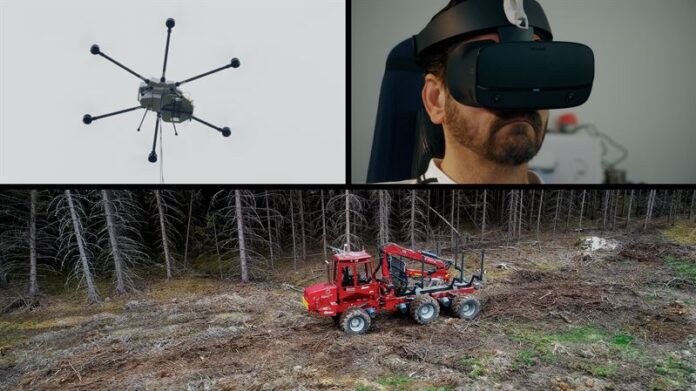Telia said that the project aims to investigate how drone technology and 5G could enable the use of remote-controlled vehicles in remote areas around Sweden
Nordic telco Telia and a number of partners used a drone with its own portable mobile base station to extend a 5G network to enable a forestry machine to be remotely controlled.
The test was carried out in a forest outside Västeras, central Sweden, as part of a research project involving Telia, Mittuniversitetet, Ericsson, Skogforsk, SCA, Volvo CE and Biometria, co-funded by Vinnova and the program for Advanced Digitalization.
The project was able to remotely control a timber loader at SCA’s Torsboda timber terminal outside Timrå in northern Sweden. After that success, in November 2021, the group set itself the challenge of using a drone equipped with its own portable mobile base station to extend 5G network coverage to an area where there would otherwise be none, and to use that temporary connectivity to enable a forestry machine to be remotely controlled. At the beginning of May, successful tests were carried out in a forest in Virsbo, outside Västeras.
Magnus Leonhardt, head of strategy and innovation for Telia Sweden’s B2B business, said: “We can now establish that it is possible to connect and remotely control large vehicles via a drone, which in practice acts as a base station in the mobile network. This creates completely new and flexible opportunities to connect businesses that work in areas with insufficient network coverage. Apart from the forestry and agricultural industry, the technology can be used in disaster areas if normal mobile coverage is completely knocked out.”
Telia noted that the forestry machine was transported to a clear-cutting site where it was connected using 5G mounted on a drone. During the test, the drone was approximately 500 meters from the forestry machine but created a coverage area extending up to three kilometers. The driver of the forestry machine was in Skogforsk’s remote control lab in Uppsala, roughly 80 kilometers away, explained Petrus Jönsson, a researcher and deputy program manager at Skogforsk, who participated in the test.
“In this test, we chose to remotely control a forwarder in a clearing to assess the connection via the drone,” Jönsson said. “In the next step, we want to test connecting and remotely controlling a soil preparation machine, which is a much heavier machine that operates in inaccessible terrain. The goal for us is to improve the working environment for the drivers, and soil preparation workers, in particular, operate in a very tough environment.”
The Nordic carrier highlighted that the project aims to investigate how drone technology and 5G could enable the use of remote-controlled vehicles in remote areas around Sweden.
Earlier this year, Telia said it had obtained funding from the European Union (EU) to build dedicated 5G networks in five locations across Sweden.
The Swedish carrier noted that these advanced networks will carry a number of projects for digital innovation in areas such as transport and logistics, agriculture and healthcare.
Telia’s new local dedicated 5G networks will be deployed in five strategically important locations for Sweden, such as the Ultuna agricultural testbed, Luleå Harbour, Boden Industrial Park, Skellefteå Smart City and hospitals in the Stockholm region.
With funding of 3 million euros ($3.30 million), the Research Institutes of Sweden (RISE), Telia and other partners, will establish networks and lead digitization projects in four of the strategic locations.

